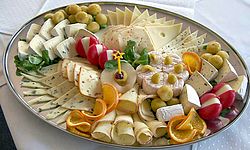Yeldan cuisine
Contents
Cuisine
Yeldan Cuisine varies greatly from region to region. Also, Yeldans have come in contact with a myriad of different cultures which have had a marked influence on the Yeldan diet, particularlly in recent years. Here we will deal only with "traditional" Yeldan cuisine from the areas around Yelda and Bigiök. Plant and animal life on Trid is similar to that found on Earth. The Yeldan foods mentioned here can be taken to closely resemble their Earth equivalents in taste, smell, texture and appearance unless otherwise noted.
Eating Habits
Yeldans take four meals a day. Yeldan breakfasts consist of eggs, cheese, sausages, fried and grilled meats, rice and breads. These are accompanied by fruits, potatoes (usually fried) and juices. Cereals and various pastries are also sometimes eaten. Lunch is normally lighter fare consisting of sandwiches, sliced meats, cheeses or soups. In mid-afternoon, a smallish meal known as Çaë is eaten. Dinner is the main meal of the day and often consists of an entree, numerous side-dishes, bread and dessert. Grilled and roasted meats are the centerpiece of a Yeldan dinner.
Dairy
</div>There are at least a thousand varieties of Yeldan cheese. In addition to cheeses, Yeldans are also fond of yoghurt. But cheeses make up the greatest amount of dairy consumption by far.
Meat
Meat is usually grilled, smoked or pot-roasted. Stews and casseroles containing meat, vegetables and pasta are served often. Traditionally, meat is marinated and heavily seasoned, smoked meats in particular. Beef and pork are equally popular, poultry is less so. Game meats such as venison and wild boar are also eaten. Another popular game animal is the Klöllen a large bear sized, weasel-like animal which is pit-roasted whole. In addition, Yeldans enjoy a variety of sausages and dried meats.
Fish
Fish is a staple of the Yeldan diet in coastal areas, however freshwater fish are not as popular. Shellfish of all varieties are eaten either fried, stir fried or steamed and served with pasta.
Vegetables
Green vegetables are grown in abundance. Vegetables are often eaten in stews or vegetable soups, but can also be served as a side dish. Spinach, peas, beans, broccoli, asparagus and a dwarf cabbage similar to Brussels sprouts are common. Potatoes and yams are also regularly served. Onions and garlic are much used in Yeldan cooking, but are never eaten raw. Yeldan tolaþ mushrooms, which taste like liver, are considered a delicacy.
Side Dishes
Pasta and egg noodles are very common, especially in the southern areas. Dumplings cooked in a variety of broths are also well liked.
Drinks
Ale is very common throughout all parts of Yelda, however, lager and pilsner style beers have never gained much of a following. Popular styles of ale are stout, porter, brown ale and bitter.
Mead is a popular drink. Flavored meads are favored over plain honey mead. Metheglin or mead that also contains spices like cloves, cinnamon or nutmeg, and melomel, a mead that contains fruit are very popular.
Wine is popular as a beverage to be served with meals. It is rarely consumed for its intoxicant effect.
Coffee and tea, though not native to Yelda, have become increasingly popular in recent years.
Spices and condiments
Mustard, vinegar, various hot-pepper sauces, and sauces similar to soy and worchestershire are commonly found on Yeldan tables. Spices similar to black pepper, basil, oregano, cilantro and ginger are much used.
Desserts
Yeldans enjoy pies and pastries made with fresh fruit. Cheesecake is, of course, very popular as well.
Bread
Yelda boasts at least 100 different types of bread, ranging from white wheat bread to black rye bread. Most types of bread contain both wheat and rye flour, and often wholemeal and seeds (such as linseed, sunflower seed, or pumpkin seeds) as well.

